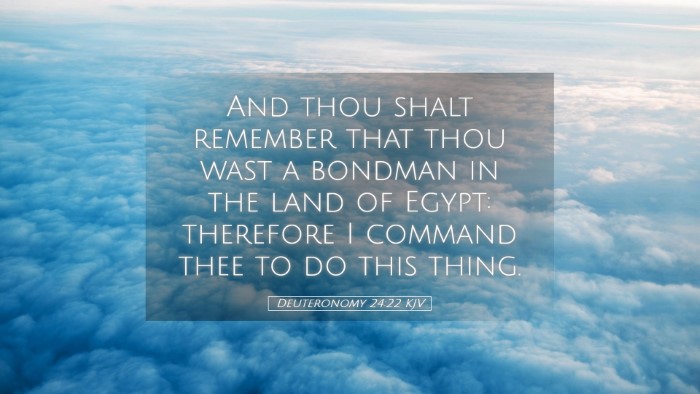Commentary on Deuteronomy 24:22
Bible Verse: "And you shall remember that you were a slave in the land of Egypt; therefore I command you to keep this statute."
Introduction
The verse encapsulates a vital principle of justice and social responsibility within the community of Israel. The command to remember their past as slaves in Egypt serves multiple purposes, including fostering empathy, humility, and a commitment to justice.
Historical Context
Deuteronomy, a reiteration of the Law given to the Israelites, is situated in a context where God's people are reminded of their deliverance from bondage. The legal codes presented here are not merely regulations but a reflection of the covenantal relationship between God and Israel.
Understanding Slavery in Ancient Israel
In ancient times, slavery was a common institution. However, the nature and purpose of servitude differed significantly from the racialized slavery seen in modern times. In many cases, Israelites sold themselves into servitude due to debt or poverty, and the laws provided for their humane treatment and eventual release (see Exodus 21:2-6).
Commentary Insights
Matthew Henry's Perspective
Henry emphasizes the moral obligation derived from the Israelites' own history of oppression. He notes that God's command to remember their slavery is rooted in a larger ethical framework, where the experience of suffering leads to compassion for others.
- Empathy for the Oppressed: The remembrance of their past serves as a catalyst for justice toward the vulnerable in their society.
- Covenantal Obligation: By recalling their past, the Israelites are reminded that their identity in God entails caring for those who suffer.
Albert Barnes' Commentary
Barnes elucidates that this verse calls for a conscious acknowledgment of one’s past experiences as a reminder to act justly and with mercy towards others. He suggests that remembering one's previous state of oppression instills a profound sense of duty to aid the downtrodden.
- Social Justice: The command reflects a broader ethical commandment that extends beyond merely preventing exploitation.
- God's Justice: The verse connects human justice with divine justice, emphasizing that those who are in power are to enact policies that uplift and protect the marginalized.
Adam Clarke's Insights
Clarke interprets this command as not only a reminder of personal history but as a universal principle for human relations. His emphasis is on the spiritual ramifications of forgetting one’s suffering.
- Spiritual Consequences: Clarke warns that forgetting one's history could lead to arrogance and a lack of compassion.
- The Call to Remember: He points to the importance of memory in shaping one's identity and moral compass.
Theological Reflections
This verse presents a fundamental theological concept regarding the treatment of others based on one's own experiences of grace and deliverance. The Israelites are challenged to reflect on their identity as a people redeemed from bondage, which should influence how they treat those currently enduring hardship.
The Nature of God’s Justice
The call to remember serves as a divine reminder that God's justice is integrated with human ethics. It underscores the expectation that those who have received grace are to reflect that grace into their communities.
Implications for Today
For pastors, students, and theologians today, Deuteronomy 24:22 serves as a powerful reminder of the importance of justice and compassion in the church and society at large. The inheritance of the gospel is one that calls the faithful to remember their past and to act justly towards others.
Practical Application
In practical application, churches are encouraged to initiate programs that serve the poor and destitute. The call to remember our shared humanity and history can lead to transformational outreach efforts.
- Community Vigilance: Actively engage in social justice movements.
- Educational Programs: Teach the narratives of history that encourage empathy and understanding among congregants.
Conclusion
Deuteronomy 24:22 is not just an exhortation to remember the past; it is a profound call to live out the ethics of one’s history. By embodying the principles of justice and compassion reflected in this scripture, individuals and communities can demonstrate a faith that is alive and responsive to the needs of the marginalized. As we reflect on this verse, may we be stirred to advocate for justice and mercy in all spheres of life.


